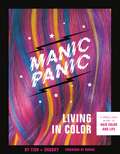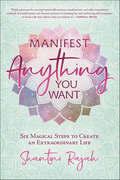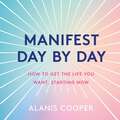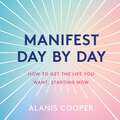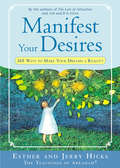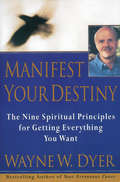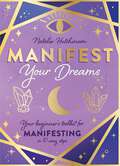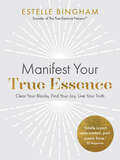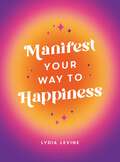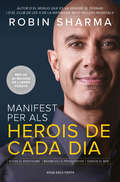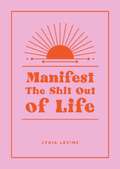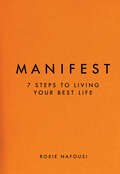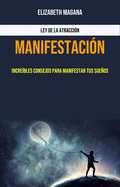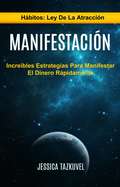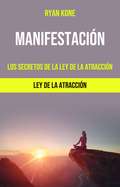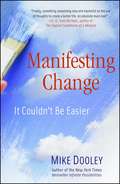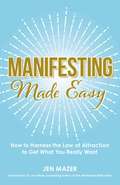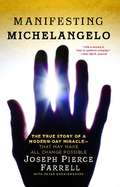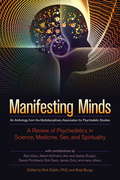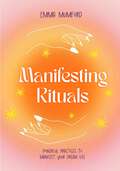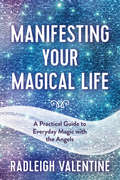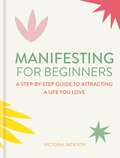- Table View
- List View
Manic Panic Living in Color: A Rebellious Guide to Hair Color and Life
by Tish Bellomo Snooky BellomoReveal your inner Aurora Borealis with Manic Panic Living in Color, the audacious beauty-and-lifestyle handbook from punk rock pioneers Tish and Snooky Bellomo, founders of the iconic hair color and make-up brand.With a colorful foreword by RuPaul -- a customer/fan/friend and dye-hard for decades -- Manic Panic Living in Color is both the rollicking origin story of the sister's punk rock roots combined with a fearless guide to finding your color in the rainbow. This guide provides unique and fail-proof methods to achieve the perfect shade or combinations of colors that express the inner you, as well as maintenance, effects, tips, products, remedies, and attitude. With hundreds of inspiring photographs, Tish and Snooky will inspire you to show off your unique sense of style whether you are Red Passion, Bad Boy Blue, Electric Banana -- or all three! p.p1 {margin: 0.0px 0.0px 0.0px 0.0px; font: 15.0px Calibri} p.p1 {margin: 0.0px 0.0px 0.0px 0.0px; font: 14.0px Calibri} p.p2 {margin: 0.0px 0.0px 0.0px 0.0px; font: 14.0px Calibri; min-height: 17.0px}
Manifest Anything You Want: Six Magical Steps to Create an Extraordinary Life
by Shantini RajahBecome a Masterful ManifestorJoin Shantini Rajah on a delightful manifesting journey that integrates spiritual and scientific concepts with simple exercises and tools anyone can use to attract their dream life.Shantini's approach includes six magical yet practical ingredients and a unique, Microaction Manifesting tool called 1 Healing Breath that helps you call in your greatest desires in just a few moments each day. Featuring much more than generic techniques, this book helps you generate a deep sense of safety in the body, mind, and spirit so you can confidently and joyfully partner with the Universe to receive everything you desire.Whether you want to start a successful business, find true love that lasts a lifetime, or bravely speak your truth, Manifest Anything You Want will get you there in ways that are inspiring, easy, and fun.
Manifest Day by Day: How to Get the Life You Want, Starting Now
by Alanis CooperA guide to manifesting from one of the biggest UK TikTok experts on the subject.If you are feeling stuck, need help achieving your goals or want to make positive changes in any area of your life, this is the audiobook for you.Alanis Cooper has been using manifesting to change her life since 2019, and in this audiobook, she shares her secrets, and gives you the tools to manifest whatever it is you are looking for. From the rule of attraction, to scripting, visualisation, meditation and more, this audiobook will help you begin a daily practice that will change your life forever.Divided into sections covering all the big topics, month by month (friends, family, romance, personal development and more), this audiobook will make manifesting work for you to get the life you want, starting now.(P) 2022 Headline Publishing Group Ltd
Manifest Day by Day: How to Get the Life You Want, Starting Now
by Alanis CooperIf you are feeling stuck, need help achieving your goals or want to make positive changes in any area of your life, this is the book for you.Alanis Cooper has been using manifesting to change her life since 2020, and in this book, she shares her secrets, and gives you the tools to manifest whatever it is you are looking for. From the rule of attraction, to scripting, visualisation, meditation and more, this book will help you begin a daily practice that will change your life forever.Divided into sections covering all the big topics, month by month (friends, family, romance, personal development and more), this book will make manifesting work for you to get the life you want, starting now.
Manifest Day by Day: How to Get the Life You Want, Starting Now
by Alanis CooperIf you are feeling stuck, need help achieving your goals or want to make positive changes in any area of your life, this is the book for you.Alanis Cooper has been using manifesting to change her life since 2020, and in this book, she shares her secrets, and gives you the tools to manifest whatever it is you are looking for. From the rule of attraction, to scripting, visualisation, meditation and more, this book will help you begin a daily practice that will change your life forever.Divided into sections covering all the big topics, month by month (friends, family, romance, personal development and more), this book will make manifesting work for you to get the life you want, starting now.
Manifest Your Desires: 365 Ways To Make Your Dreams A Reality
by Esther Hicks Jerry HicksThis information-packed little book,which presents the teachings of the nonphysical entity Abraham, will help you learn how to manifest your desires so that you’re living the joyous and fulfilling life you deserve. Each day, you’ll come to understand how your relationships, health issues, finances, career concerns, and more are influenced by the Universal laws that govern your time-space reality—and you’ll discover powerful processes that will help you go with the positive flow of life. So start making your dreams a reality . . . right now!
Manifest Your Destiny: The Nine Spiritual Principles for Getting Everything You Want
by Wayne W. DyerFrom the inspirational leader and author of the international bestsellers Your Sacred Self and the classic Your Erroneous Zones comes this mind-awakening guidebook for making your desires reality. Based on ancient principles and spiritual practices, Manifest Your Destiny introduces the Nine Spiritual Principles that will help you overcome the barriers--both within and around you--that prevent you from getting what you want, including:Developing spiritual awarenessTrusting yourselfReconnecting to your environmentAttracting your desiresAccepting your own worthinessPracticing unconditional loveMeditating to unlock the power within youLetting go of demandsFilled with warmth and insight, this invaluable book will help you achieve your goals--and take you to a level higher than you've ever dreamed.
Manifest Your Dreams: Your beginner’s toolkit for manifesting in 10 easy steps
by Natalie Jade HutchinsonYour dreams are just within your reach - master the magic of manifestation in 10 steps and bring those dreams to life.Manifesting is a philosophy and a practice to help you visualise and achieve your dream goals, discover self-love and live a life full of good vibes and gratitude. An internet sensation, with 19 billion views of #manifestation alone on TikTok, the world is discovering the power of manifesting techniques. But what is manifesting and how does it work? This book takes you through 10 practical steps for how to manifest, covering what manifesting is to begin with, how you can use it, and different ways of manifesting. It is a beginner's guide, making it perfect for anyone curious about manifesting but unsure where to start.The author, Natalie Hutchinson aka Manifesting Minnie, is a guiding light for readers who want to manifest their dreams. With her friendly and approachable tone and the book's beautiful illustrations throughout, Natalie's tips and instructions are easy to follow. From explaining the Law of Attraction and how you can manifest your desires by planting the seeds of your goals, to harnessing the power of crystals and the moon, Natalie leaves no manifesting stone unturned.This step-by step guide will help you recognise your self-worth, get clear on what you want, ask the universe, work toward your goals, change your mindset, feel the joy, be grateful and set a healthy manifesting routine.*Includes practical techniques such as guides to manifesting with crystals, journaling, visualisation and mastering the 5 x 55 technique.*If you have the power to see something and believe it, you have the power to make it happen.
Manifest Your True Essence: Clear Your Blocks, Find Your Joy, Live Your Truth
by Estelle Bingham&‘This book will open your eyes, touch your heart and change your life forever. Within these pages, Estelle draws from her years of wisdom and experience to create a powerful framework for true healing.&’ – Fearne CottonReclaim your power to heal, stay connected to your purpose and manifest the heart-led life of your dreams with holistic healer and world-renowned coach Estelle Bingham.This transformational book is a distillation of the 20+ years Estelle has spent working to support and reconnect people with their own power to heal, manifest and experience joy in their life. You'll discover her potent practices to tackle all the blocks to your desires and dreams and be guided through keys and rituals to help you come into true and perfect alignment with your Original Heart Energy.By working with Estelle's tried-and-tested True Essence Process™ and accessing your inner Master Healer, you'll become a direct conduit for flow, beauty and prosperity, and unlock codes to help you:Transcend your deepest trauma Rewire your subconsciousNurture a deeper and more sacred connection to yourself and your source energyDiscover and stay connected to your purposeCo-create your unique version of success and happinessManifest Your True Essence is the much-needed catalyst you need to dynamically heal, express your truth and embody your true joy and potential. It's time. And the time is now.
Manifest Your Way to Happiness: All the Tips, Tricks and Techniques You Need to Manifest Your Dream Life
by Lydia LevineThis easy-to-use guide is filled with bite-sized tips, techniques and inspiration for helping you to manifest your best lifeEveryone’s definition of happiness looks different; whether you base your contentment on success, love or financial security, this book will help you to identify and clarify your goals, and provide you with everything you need to start manifesting the life of your dreams.Manifestation is one of the most powerful tools we have at our disposal, and the good news is that anyone can try it – the universe is ready and waiting to help you achieve your goals, realize your dreams and live your best life. By harnessing your positive energy through techniques such as visualization and scripting, you can communicate your desires to the universe and start working towards attaining them.It’s time to start changing your life through the power of your mind! Inside you’ll find:A range of manifesting techniques to maximize successEasy-to-follow visualization methodsTop tips on how to get the most out of your manifestingUplifting quotes and affirmations to inspire your journeyTrust in the universe and it will deliver.
Manifest per als herois de cada dia: Activa el positivisme, maximitza la productivitat, serveix el món
by Robin SharmaARA ÉS EL TEU MOMENT / AQUESTA ÉS LA TEVA GUIA Durant més de vint-i-cinc anys, Robin Sharma, el llegendari expert en lideratge i en excel·lència, ha ensenyat discretament a titans dels negocis, a colossos de l'esport professional i a superestrelles del món de l'espectacle un sistema revolucionari que els ha ajudat a convertir les seves màximes aspiracions en resultats diaris palpables. Ara, a Manifest pels herois de cada dia -la seva obra mestra-, l'innovador Robin Sharma ha destil·lat els principis fonamentals, els protocols i les tàctiques del seu mètode de mentoring per crear una obra de gran valor que és, alhora, un compendi d'estratègies per assolir una productivitat inesgotable, un manual per portar una vida incomparable i una guia universal per arribar a ser un líder espiritual capaç de portar el món a remolc teu. Al llarg de les pàgines d'aquest llibre absolutament únic hi descobriràs: -Pautes reals de com les persones més creatives, productives i pròsperes del planeta adquireixen hàbits insuperables, controlen la rutina diària i s'organitzen la vida en les esferes més elevades. -Pràctiques poderoses per millorar l'energia, augmentar la vitalitat i prolongar la longevitat per tal de donar forma al geni que portes dins. -Un model demostrat per dur a terme feines excepcionals de lideratge en el teu sector que il·luminin les generacions futures. -Tècniques basades en la neurociència per convertir els problemes en triomfs, els temors en esperons i els patiments del passat en heroisme quotidià. -Una saviesa inusual (adquirida amb esforç) per millorar la vivacitat, per incubar una serenor sublim i per dignificar la llibertat espiritual que crea una vida joiosa. Ressenyes:«L'estrella del rock del lideratge.»The Globe and Mail «Malgrat que Robin rebutgi l'etiqueta de guru, resulta difícil no referir-s'hi amb aquest terme.»Publishers Weekly «Rivalitza en seguidors amb el Dalai Lama.»The Times of India
Manifest the Shit Out of Life: All the Tips, Tricks and Techniques You Need to Manifest Your Dream Life
by Lydia LevineThis easy-to-use guide is filled with bite-sized tips, techniques and inspiration for helping you to manifest the shit out of lifeEveryone’s definition of happiness looks different; whether you base your contentment on success, love or financial security, this book will help you to identify and clarify your goals, and provide you with everything you need to start manifesting the life of your dreams.Manifestation is one of the most powerful tools we have at our disposal, and the good news is that anyone can try it – the universe is ready and waiting to help you achieve your goals, realize your dreams and live your best life. By harnessing your positive energy through techniques such as visualization and scripting, you can communicate your desires to the universe and start working towards attaining them.It’s time to start changing your life through the power of your mind! Inside you’ll find:A range of manifesting techniques to maximize successEasy-to-follow visualization methodsTop tips on how to get the most out of your manifestingUplifting quotes and affirmations to inspire your journeyTrust in the universe and it will deliver.
Manifest: 7 Steps to Living Your Best Life
by Roxie NafousiTHE INSTANT INTERNATIONAL BESTSELLER Change your life with the first truly practical guide to manifesting, the hugely popular self-development practice that will transform your life for good . . . Written by self-development coach and 'Queen of Manifesting' Roxie Nafousi, this book is the essential guide to anyone and everyone wanting to feel more empowered in their lives. In just seven simple steps you can understand the true art of manifestation and create the life you have always dreamed of. Whether you want to attract your soulmate, land the perfect job, buy the home you have always wanted, or simply find more inner-peace and confidence, Manifest will teach you exactly how to get there . . . 1. Be clear in your vision2. Remove fear and doubt3. Align your behavior4. Overcome tests from the universe5. Embrace gratitude without caveats6. Turn envy into inspiration7. Trust in the universe A meeting of science and wisdom, manifesting is a philosophy and a self-development practice to help you reach for your goals, cultivate self-love and live your best life. Unlock the magic for yourself and begin your journey to turning your dreams into reality.
Manifestación: Increíbles Consejos Para Manifestar Tus Sueños
by Elizabeth MaganaEnfrentarás soledad, angustia e incluso el rechazo si no usa la Ley de Atracción para el amor. ¿Qué están haciendo las personas para atraer a una persona específica, como tú quieres? Como experto en Ley de Atracción, he ayudado a personas a manifestar relaciones con hombres y mujeres específicos. Uso técnicas poco conocidas de la Ley de Atracción para ayudarlos a ser una combinación vibratoria con una persona específica. Aquí te muestro cómo aplicar estas técnicas para manifestar la relación que deseas, asegurándote de que todas tus necesidades y deseos se cumplan. En El Manifesto de Manifestación, el exitoso autor Forbes Robbins Blair te ayuda a dejar de manifestar lo que no quieres. El libro te inspira y motiva para crear la vida que sientes que mereces, sin necesidad de visualizar nada. A partir de las décadas de experiencia y experimentación del autor, este libro incluye muchos enfoques y estrategias de atracción originales que no encontrarás en ningún otro lugar. Descarga y comienza a mejorar la CALIDAD de tu manifestación ahora.
Manifestación: Increíbles Estrategias Para Manifestar El Dinero Rápidamente (Hábitos: Ley De La Atracción)
by Jessica TazkuvelUsted no está solo. Cualquier obstáculo o desafío que enfrente, cualquier amenaza o adversario que aparezca ante usted, cualquier posibilidad que busque o cualquier montaña de la vida que desee usted conquistar, la ayuda angelical divina está lista para intervenir en su beneficio. Cuando el poder ilimitado de los ángeles mágicos está con usted, los obstáculos se vuelven oportunidades, las épocas de crisis se tornan plataformas para mejores días, las relaciones prosperan, las enfermedades se vuelven un bienestar, los retos se convierten en victorias y los milagros ocurren. He leído todo acerca del Nuevo Pensamiento y de lo importante de la Ley de la Atracción, a Wallace Wattles, a Anthony Robbins, a Rhonda Byrne, a Napoleon Hill, a Esther Hicks y a Wayne Dyer. Pero sin importar cuántos libros haya leído o qué tan de cerca he seguido sus instrucciones para la manifestación del dinero o del amor, no pude hacer que funcionara. Fue hasta que reconocí, comprendí y finalmente acepté que lo que estaba haciendo en realidad era algún tipo de magia que de repente las cosas empezaron a ocupar su exacto lugar. Una vez que me di cuenta de que el poder venía de dentro de mí, fue como si la luz de golpe se hubiera encendido y mis manifestaciones empezaron a funcionar. Aprendí cómo manifestar el dinero y el amor, pero también aprendí cómo ser feliz, realmente feliz. Descargue hoy mismo este libro y encamínese a lograr su sueño mañana.
Manifestación: Los Secretos De La Ley De La Atracción
by Ryan KoneEn este libro, el autor enseña al lector los secretos de la manifestación: cómo manifestar, la Fórmula de la Manifestación, cómo emprender acciones alineadas con tus deseos, cómo eliminar los bloqueos mentales y emocionales que impiden la manifestación y los cinco errores más comunes en la manifestación.
Manifesting Change: It Couldn't Be Easier
by Mike DooleyIf there was just one thing I could tell you about living the life of your dreams, knowing that if you understood it, it would be enough, I would ask you to realize that you already are living that life. In his most advanced work to date, Mike Dooley builds on the concepts of his New York Times bestseller Infinite Possibilities by using his revolutionary concept, the Matrix, to take the art of deliberate creation to the next level. Taking us behind the curtains of time and space, Dooley guides us through the practice of choosing our desired end results without getting too attached to the details or messing with the "cursed hows." Manifesting Change breaks down the metaphysical mechanics behind every physical manifestation through exercises, stories, and analogies that illustrate just how the Matrix will show the flow of events that will, or will not, trigger changes in your life based upon your thoughts, words, and actions. It will help you understand what you really want, why you really want it, and how to go about getting it with supreme confidence. Set life's magic in motion and accelerate the arrival of all that your heart desires with this complete master's guide to creating the life of your dreams.
Manifesting Made Easy: How to Harness the Law of Attraction to Get What You Really Want
by Jen Mazer"Jen, you surprised me and impressed me. So well done! I applaud you for what you're doing. You're making a difference and helping women everywhere." --Dr. Joe Vitale, New York Times bestselling author and star of the hit movie The Secret "Thank you, Jen. I love you. You're a soul sister.” --Janet Bray Attwood, New York Times bestselling author of The Passion Test "I know who to call if I get stuck. Because every now and then, you need a refresher to remind you of what you know. If I need to remember, I'm gonna call the Queen of Manifestation." --Rickie Byars Beckwith, world-renowned singer and musical director of Agape International Spiritual CenterLive the life you deserve! Are you living the life you want? If the answer is no, the truth may surprise you. The truth is, most of us have hidden stumbling blocks preventing us from achieving the abundance we deserve. Jen Mazer, the "Queen of Manifestation," teaches you how to free yourself from limiting beliefs and embrace the idea of "acting as if" to attract what you desire--love, happiness, good health, or career success.Manifesting Made Easy takes you step by step through the process of manifesting, from understanding what it is you want, to mapping out ways to make it a reality, to signaling to the universe that you're ready for good things to come your way. With exercises, writing prompts, and a wealth of personal success stories, you'll learn how to attract the right circumstances and people so you can start living the life of your dreams.
Manifesting Michelangelo: The Story Of A Modern-day Miracle--that May Make All Change Possible
by Peter Occhiogrosso Joseph Pierce Farrell"And then it happened ... a ray of illumination shot straight up and down to the left and the right, forming a pair of axes. My heart began to beat very fast, yet I didn't blink. I couldn't have taken my eyes off what I was seeing if I had wanted to." At the dawn of the new millennium, Joseph Pierce Farrell made a startling discovery that holds the potential to transform the world. Having abandoned his childhood dream of a career in healthcare, he had settled for a passionless job in real estate, lining his pockets while eroding his soul. Then one day he fell into a humble job restoring antiques and furniture. One evening while working in his basement studio, he drifted into a meditative state and permitted his mind to soar with the unlimited imagination of a child. In that moment, he experienced a brilliant, blinding flash that ignited within him a remarkable power. Since that transformative moment, he has restored the facial features of a severely disfigured young man, virtually erased an inoperable brain tumor, dramatically reversed the aging process of the faces of celebrities, and mended broken bones--simply with intention supported by a profound connection to a higher source. After a decade of his pioneering work exploring consciousness and its relationship to health and healing, Farrell was invited to present his findings internationally in academic settings, catapulting him to the cutting edge of the integrative healthcare movement. Endorsed by leading researchers and medical doctors, Farrell's body of evidence has begun to construct a bridge to permit science and spirituality to heal their divide and advance the emerging integrative healthcare model. In this unprecedented book, Farrell chronicles his journey of discovery and poignant stories of human transformation. He outlines an easy-to-follow five-step process that readers can use to ignite their own capacity to manifest change in their lives and the world. Heralding a message of unlimited possibility, Manifesting Michelangelo makes a compelling argument, supporting what science is beginning to embrace, what the great artists have always known, and what spiritual traditions have long promised--that we possess a latent capacity to manifest on the level of the miraculous. It is the first book that asks us to believe--based not on faith alone, but on eyewitness medical testimony, scientific evidence, and profound photos--that we have the capacity to manifest the change in the world that our conscience decrees and our hearts desire.
Manifesting Minds
by Rick Doblin Brad BurgeFeaturing essays and interviews with Timothy Leary, Aldous Huxley, Ram Dass, Albert Hofmann, Alexander (Sasha) Shulgin, Daniel Pinchbeck, Tim Robbins, Arne Naess, and electronic musician Simon Posford, as well as groundbreaking research and personal accounts, this one-of-a-kind anthology is a "best of" collection of articles and essays published by the Multidisciplinary Association for Psychedelic Studies (MAPS). Topics include the healing use of marijuana and psychedelics--including MDMA, ibogaine, LSD, and ayahuasca--for PTSD, anxiety, depression, and drug addiction, as well as positive effects of these substances in the realm of the arts, family, spirituality, ecology, and technology. Among many other thought-provoking and mind-opening pieces are the following:* "On Leary and Drugs at the End," by Carol Rosen and Vicki Marshall * "Psychedelic Rites of Passage," by Ram Dass * "To Be Read at the Funeral," by Albert Hofmann * "Another Green World: Psychedelics and Ecology," by Daniel Pinchbeck * "Psychedelics and Species Connectedness," by Stanley Krippner, PhD * "Huxley on Drugs and Creativity," by Aldous Huxley* "Psychedelics and the Deep Ecology Movement: A Conversation with Arne Naess," by Mark A. Schroll, PhD, and David Rothenberg * "Psychedelic Sensibility," by Tom Robbins * "Electronic Music and Psychedelics: An Interview with Simon Posford of Shpongle," by David Jay Brown * "How Psychedelics Informed My Sex Life and Sex Work," by Annie Sprinkle* "Consideration of Ayahuasca for the Treatment of Posttraumatic Stress Disorder," by Jessica Nielson, PhD, and Julie Megler, MSN, NP-BC * "Psychedelics and Extreme Sports," by James Oroc * "Youth and Entheogens: A Modern Rite of Passage?," by Andrei Foldes with Amba, Eric Johnson, et al. * "Diary of an MDMA Subject," by Anonymous* "Dimethyltryptamine: Possible Endogenous Ligand of the Sigma-1 Receptor?," by Adam L. Halberstadt * "Lessons from Psychedelic Therapy," by Richard Yensen, PhD * "Psychosomatic Medicine, Psychoneuroimmunology, and Psychedelics," by Ana Maqueda * "Talking with Ann and Sasha Shulgin about the Existence of God and the Pleasures of Sex and Drugs," by Jon Hanna and Silvia ThyssenFrom the Trade Paperback edition.
Manifesting Rituals: Powerful Daily Practices to Manifest Your Dream Life
by Emma MumfordTurn your dream life into an abundant reality with the power ofmanifestation rituals.This beautifully illustrated oracle book is designed to give you instant daily guidance from the Universe to help you manifest anything you desire, without limits. Whether your concern is about romance, career, health or even everyday decision-making, you can use this book to get clear answers and support. Connect with the messages and rituals either by seeking the answer to a burning question, or picking the affirmation you feel most drawn to today. Each message in the book is accompanied by stunning artwork, guided rituals, journaling prompts and crystal suggestions to help you supercharge your manifesting powers.
Manifesting Rituals: Powerful Daily Practices to Manifest Your Dream Life
by Emma MumfordTurn your dream life into an abundant reality with the power ofmanifestation rituals.This beautifully illustrated oracle book is designed to give you instant daily guidance from the Universe to help you manifest anything you desire, without limits. Whether your concern is about romance, career, health or even everyday decision-making, you can use this book to get clear answers and support. Connect with the messages and rituals either by seeking the answer to a burning question, or picking the affirmation you feel most drawn to today. Each message in the book is accompanied by stunning artwork, guided rituals, journaling prompts and crystal suggestions to help you supercharge your manifesting powers.
Manifesting Your Magical Life: A Practical Guide to Everyday Magic with the Angels
by Radleigh ValentineClaim your authentic life where dreams come true by tapping into your inner magic, listening to angel answers, and uncovering the power of making wishes.Discover your inner power and manifest the magical life you were born to live! Radleigh Valentine offers practical, cheerful advice and simple guided exercises to support you in harnessing your energy, overcoming your limitations, and finding your happiest, most authentic self. This book will equip you with the everyday magic skills and knowledge you need in several areas: • Manifesting what you really want • Choosing joy and living a life of gratitude • Recognizing the signs from the Universe you&’re receiving every day • Communicating with the angels and accepting Divine assistance • Strategies for increasing your &“daily magic&” and your &“life magic&” Your life is meant to be one of wishes granted and dreams come true. Discover the manifesting magic within you to make that happen! (Revised edition of How to Be Your Own Genie, the first book from best-selling author Radleigh Valentine)
Manifesting for Beginners: Nine Steps to Attracting a Life you Love
by Victoria JacksonTurn your dreams into reality in just 9 simple stepsIt is one of the biggest wellness trends around, but do you know how to manifest?This beginner's guide includes all you need to get started, with key insights into the power of positive thought and practical steps for creating your reality.Each chapter is full of useful tips and easy exercises for you to try at home, from positive affirmations and actions to journaling prompts.Contents include:STEP 1: Visualize your future selfSTEP 2: Set your intentionsSTEP 3: Connect with the universeSTEP 4: Raise your vibrationsSTEP 5: Embrace the energy of gratitudeSTEP 6: BelieveSTEP 7: Take actionSTEP 8: Let go of the outcomeSTEP 9: Pay attention to synchronicities and signs
Manifesting for Beginners: Nine Steps to Attracting a Life you Love
by Victoria JacksonTurn your dreams into reality in just 9 simple stepsIt is one of the biggest wellness trends around, but do you know how to manifest?This beginner's guide includes all you need to get started, with key insights into the power of positive thought and practical steps for creating your reality.Each chapter is full of useful tips and easy exercises for you to try at home, from positive affirmations and actions to journaling prompts.Contents include:STEP 1: Visualize your future selfSTEP 2: Set your intentionsSTEP 3: Connect with the universeSTEP 4: Raise your vibrationsSTEP 5: Embrace the energy of gratitudeSTEP 6: BelieveSTEP 7: Take actionSTEP 8: Let go of the outcomeSTEP 9: Pay attention to synchronicities and signs
